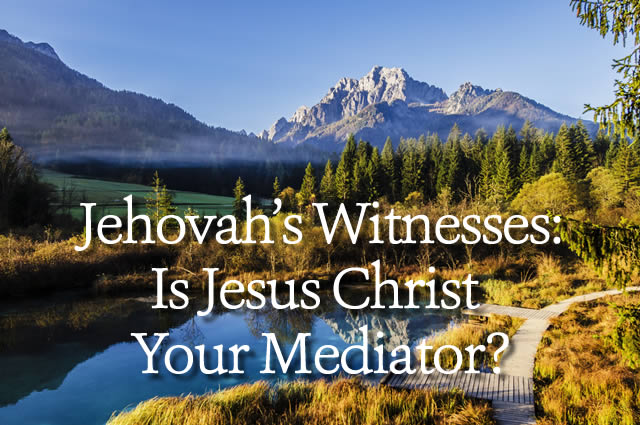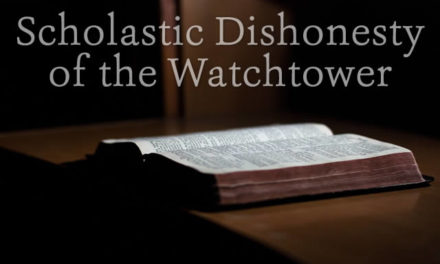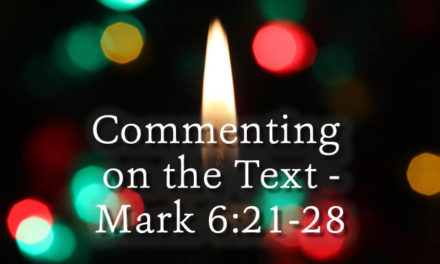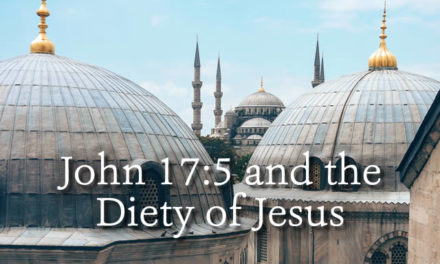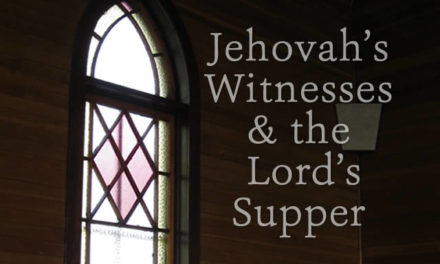The teachings of the Watchtower Bible and Tract Society regarding the mediatorship of Christ are radically at odds with the Bible. And surprising as it may be to many Jehovah’s Witnesses, the Watchtower’s teachings, if true, leave virtually all living Jehovah’s Witnesses without a mediator, and therefore without hope of forgiveness of sins and life everlasting.
The Biblical View of Christ as Mediator
To really understand this issue one must first have a clear understanding of the biblical view of the Mediatorship of Christ, and of the covenant which He mediates.
According to the Bible, Christ is the only Mediator between God and men (1 Timothy 2:5). The covenant which He mediates is through His blood, i.e., through His death (Matthew 20:28; Mark 10:45; Colossians 1:20-22; Hebrews 9:15-17, 25-28).
This covenant provides certain blessings to all those who enter into the covenant. First of all, the new covenant provides forgiveness of sins (Romans 3:24, 25; Matthew 26:28; Ephesians 1:7; Jeremiah 31:34; Hebrews 8:12; 10:17).
Forgiveness is required because man has sinned against God. Forgiveness that upholds God’s law cannot exist without atonement for sin.
Atonement requires a perfect sacrifice. Therefore, there is nothing an imperfect, sinful man can do to atone for his own sin.
A mediator is necessary. Under the old covenant the work of the High Priests was to mediate for the people by offering sacrifices for sin. However, this role was only a type of the Mediator who would come.
In the new covenant Jesus became our permanent High Priest, mediating for us by offering the perfect sacrifice of His own sinless life in atonement for our sin, thus providing forgiveness of sins.
Second, in the new covenant God promises that He Himself will write His laws on our hearts (Jeremiah 31:33; Hebrews 8:10; 10:16). That is, He is at work for all those brought into the new covenant to change their innermost being. Believers can be assured that He is going to conform them to the image of His Son (Romans 8:28, 29).
Third, the new covenant provides eternal life with God. It is sin that brought about death (Romans 5:12; 6:23) and put a barrier between man and God (Proverbs 28:9; Isaiah 59:2). In the new covenant God has promised (as shown above) to both forgive and remove sin from our lives.
By His resurrection from the dead and ascension into heaven Jesus demonstrated that His sacrifice had been accepted. Sin had been successfully atoned for (Romans 4:25). The wages of sin, death, was now abolished for all those in the new covenant; they can now enter the presence of God and live (Romans 6:23; 2 Timothy 1:10; 2:10; John 14:2, 3; Jeremiah 31:33, 34; Hebrews 8:10, 11; 10:19-22).
It must be pointed out that the roles of Christ as Mediator and as High Priest cannot be arbitrarily separated. They are virtually one and the same thing. The function of the high priest, his job, was to mediate.
Christ is our Mediator because He is our High Priest. Mediation for man before God, fully and inexorably effective for bringing in all the blessings of the covenant for all those who are in the covenant, that is what Jesus does as High Priest (Hebrews 8:1; 9:11-15, 24-28).
The Scripture speaks of no work of Christ or blessings provided by Him, as High Priest, other than those provided by His work as Mediator. The blessings of the atonement and the blessings of the new covenant are one and the same, mediated to us by our High Priest, Jesus Christ.
Similarly, Scripture speaks of no one receiving covenant blessings without being adopted into the covenant. To receive covenant blessings is to be adopted into the covenant, and vice versa. It cannot be stated too clearly or too often: forgiveness of sins cannot exist, nor eternal life be given, apart from a Mediator.
The Watchtower’s View of Christ as Mediator
What does the Watchtower teach of the Mediatorship of Christ? First, the Watchtower teaches that Jesus Christ is the Mediator of the new covenant (Insight on the Scriptures, Vol. 2, p. 360). Out of all human history, those who are in the covenant, “spiritual Israel,” are supposed to number only 144,000 (Ibid., p. 362). And Watchtower material says expressly, “Jesus’ mediatorship operates solely toward those in the new covenant” (Ibid., p. 362).
Jesus is Mediator, then, for only these 144,000. And only they will ever be together with Jesus in heaven. For it is only “by means of this covenant [that] it became possible for them to gain heavenly life with Christ…” (Survival Into A New Earth, p. 72).
Out of the several million currently registered members of the Jehovah’s Witnesses organization, only a few thousand are considered to be among the 144,000 of the new covenant, with a “heavenly hope.”
Thus, it is expressly declared that for the great mass of Watchtower members, Jesus is not their mediator and they can never expect to be with Him in heaven.
Jesus Christ is Both Mediator and High Priest
Watchtower leaders have arbitrarily and unscripturally separated Jesus Christ’s being Mediator from His being High Priest (Insight, Vol. 2, pp. 362-363). Forgiveness of sins and eternal life, blessings that scripture declares are integral to the new covenant, are then said to be available to those outside the covenant.
The possibility of forgiveness of sins and eternal life for those in the covenant is the result of Christ’s work as Mediator. The possibility of the same for those outside the covenant is said to be the result of His work as High Priest (Ibid., pp. 362-63).
The idea that forgiveness of sins (a blessing of the covenant) can be obtained by those outside the covenant, is promulgated by the Watchtower’s use of 1 John 2:2.
But when the scripture says that Jesus “is the propitiation for our sins: and not for ours only, but also for the sins of the whole world,” it is not saying that forgiveness is available for people outside the new covenant. Rather, it means the value of the atonement was of infinite worth. People presently outside the covenant can still be adopted into the covenant, and thus receive forgiveness of sins.
According to the Watchtower, the “other sheep” referred to by Jesus in John 10 “are persons who are not in the covenant… who… are being gathered within Jehovah’s provision for eternal life on the basis of their faith in the sacrificial value of Jesus’ blood. They are the same as the ‘great crowd’ of Revelations 7:9, 10, 14, and so they have the prospect of surviving the coming great tribulation…they are included in the great crowd of prospective survivors of the coming day of divine wrath” (Survival, pp. 73, 80). They are said to be “putting faith in the merit of his ransom sacrifice” (Insight, Vol. 2, p. 363) These, of course, are the Jehovah’s Witnesses not included in the 144,000.
Speaking of “putting faith in the merit of his ransom sacrifice” and “the sacrificial value of Jesus’ blood” not only gives the appearance of being Christian, it naturally leads many Jehovah’s Witnesses to falsely suppose that Jesus is their Mediator. But if the Watchtower is correct, Jesus cannot be their mediator unless they are a part of the 144,000.
That so many Jehovah’s Witnesses think of Jesus as their Mediator is, in fact, testimony to the real truth that forgiveness of sins cannot exist nor eternal life be given apart from a mediator. Those are provisions of the covenant, mediated by Jesus’ blood, the “blood of the new testament [covenant], which is shed for many for the remission of sins” (Matthew 26:28).
Speaking of Christ providing these blessings as High Priest and not as Mediator totally ignores all the biblical facts concerning the role of the High Priest and the nature of his work to mediate.
It also contravenes the Jehovah’s Witnesses own definition of a mediator: “One who interposes between two parties who are at variance to reconcile them; an intercessor; an intermediary agent or go-between” (Insight, Vol. 2, p. 360)
If Jesus forgives the sins of ordinary Jehovah’s Witnesses, those who are in the “great crowd,” then He certainly has “interposed between” them and God, “two parties at variance to reconcile them.” He has become their “intercessor.” By their own definition this makes Him their Mediator.
Yet they say, “…Jesus’ mediatorship operates solely toward those in the new covenant, i.e. the 144,000..”(Ibid., p. 362).This is actually to deny the possibility of forgiveness of sins for all others. To claim forgiveness of sins for the “great crowd” is to deny the claim that Christ is Mediator for only the 144,000. Forgiveness is impossible without a Mediator.
Already, the Jehovah’s Witness is faced with a choice. He can believe the Watchtower’s teaching is true, or he can have forgiveness of sins through the Mediator of the new covenant. He cannot rationally believe the former and at the same time hope for the latter, unless he is part of the 144,000. But this morass of confusion is still not the worst of Watchtower doctrine on the subject.
The 144,000 as Mediators
Since it denies that Jesus is the mediator for all but the 144,000, Watchtower doctrine has elevated these 144,000 to the position of being mediators themselves. Note carefully again the last phrase of the Watchtower’s definition of a mediator: “an intermediary agent or go-between.” Then read the following statements about the 144,000:
“With Christ they make up the agency by means of which blessings will be extended to all other obedient ones among mankind” (Survival, p. 65). “Being made kings and priests by reason of the new covenant that he [Jesus] mediated, they will share in administering the blessings of Jesus’ sacrifice [such as forgiveness of sins] and of his Kingdom rule to all the nations of the earth. Christ’s mediatorship, having accomplished its purpose by bringing ‘the Israel of God’ into this position, [as “intermediary agents”] thus results in benefits and blessings to all mankind” (Insight, Vol. 2, p. 363).
In direct and blasphemous contradiction to the Word of God (1 Timothy 2:5), these statements unequivocally class the 144,000 as mediators for the rest of humanity surviving Armageddon, according to the Watchtower’s own definition of the word mediator as quoted above.
The Watchtower as Mediator
It might seem that 144,000 mediators would be enough. But there is still an additional group of leaders: the Watchtower Society itself. To be sure, the leaders don’t dare call themselves mediators; rather, “the faithful slave class.”
However, their role is as “an intermediary agent or go-between,” providing “meat in due season.” According to them, meat in due season means teaching and instruction the Jehovah’s Witness cannot do without if he is to be “reconciled” to Jehovah God: “All who want to be marked as having God’s approval must accept the instruction that Jehovah is providing through that ‘slave’ class and become true worshippers of Jehovah” (Survival, p. 96). The role they have assigned to themselves unmistakably qualifies as a “mediator” according to their own definitions.
The Final Irony
When Christ alone is not enough, the multiplication of those things deemed necessary to obtain salvation becomes endless.
As was noted earlier, the great majority of Jehovah’s Witnesses, the other sheep, are only “prospective survivors” of Armageddon (Survival, p. 80). Whether or not they will be actual survivors depends upon their own attributes (virtues), attitudes (values) and achievements (works). Jehovah’s Witnesses can never know for certain in this life if they have been good enough, or done enough, to inherit life everlasting.
Hope is dangled before them by the use of intentionally vague terms like “persons of godly devotion” (Ibid., p. 52), and “right-hearted people” (Ibid., p. 86). Perhaps they will qualify! But if they do everything that is required of them, their only hope is for life on this earth, apart from God, Christ and the 144,000 mediators. They have no heavenly hope, and to attain even their earthly hope, “no less faithfulness is required of them than of those who are spirit-anointed Christians,” i.e. the 144,000 who do go to heaven (Ibid., p. 67). Jehovah’s Witnesses die and receive no reward at all if they do not meet all the requirements. If they do meet these requirements, for the same works in this life as the 144,000, they receive an unequal reward, for all eternity.
And just what must Witnesses really do to receive this unequal pay? Is there any concrete standard by which “godly devotion” and “right-heartedness” will be gauged? Actually there is. The standard is, “Full harmony with Jehovah’s requirements” (Ibid.). Obviously, any sin would not be full harmony.
Christians should hold Jehovah’s Witnesses accountable to some questions posed by the Watchtower’s own articles.
Some Important Questions
The King commands us not to sin (Isaiah 1:16; Matthew 5:48). “Are you truly submitting to his authority as King?” (Survival, p. 64).
“Do you give Jehovah your exclusive devotion, allowing nothing to infringe on the place that he should hold in your heart?” (Ibid., p. 92).
“Jesus Christ, who is Jehovah’s executioner today, cannot be tricked…” (Ibid., p. 60). Will he execute you?
Is There Any Hope?
Christians should also offer the hope of the real gospel. Some questions which could be used after sharing the material above are, “Do you recognize your need of forgiveness for your sins? Do you want everlasting life? Those are blessings available only through a Mediator. If Jesus Christ is not your mediator then you have none. You will not receive forgiveness of sins or life everlasting. Would you not rather accept Jesus now as your Mediator, rather than face Him later as your ‘executioner?’
By Timothy Oliver

